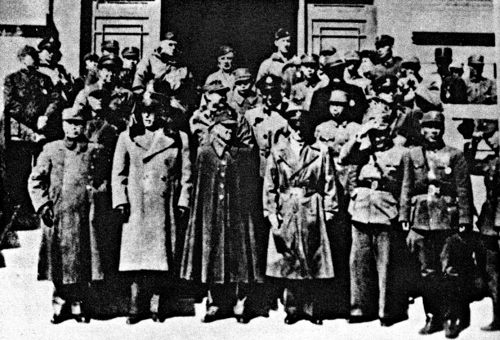|
 |
|
Zhou Enlai (first left), and General George Marshall (second left) who was sent on a mediation mission to China in 1945, during their trip in Jiangsu Province on March 2, 1946, three months before the outbreak of the War of Liberation (FILE) |
China's land issue was an old problem. "Land to the tiller" had been the cry for over 2,000 years, in peasant revolt after peasant revolt. However, mere changes of dynasty had failed to change the fate of the peasants. It was left to the CPC to solve this age-old problem.
Before 1949, the land tenure situation of various classes was extremely irrational. Jack Belden, an American, pointed out in his book China Shakes the World that in general, landlords and rich peasants, who accounted for about 10 percent of the population, owned 55 to 65 percent of the land. A more accurate estimate would be 70 to 80 percent.
To change this situation, on May 4, 1946, the CPC issued the Instructions on Land Issues, which announced the CPC's support for the masses in their efforts to acquire land from the landlords, and in struggles for reduction of rent for land and of interest on loans. By the first half of 1949 in the old liberated areas like northeast China, north China, northwest China and east China's Shandong and Jiangsu provinces, and the newly liberated areas, the land had basically been distributed evenly, and nearly 100 million peasants had acquired land for the first time.
They flocked to join the army and supported the front. In Shandong alone, during the civil war, 950,000 men joined the CPC forces, and more than 11 million farmers and militiamen were mobilized to help the army transport logistic materials. Moreover, the CPC-led rural reform completely changed the appearance of China's rural areas and the attitudes of the peasants.
In October 1944, Michael Mansfield, a congressman from the U.S. state of Montana, came to China as a representative of President Roosevelt. In January 1945 he returned to Washington D.C. and submitted a report to the Congress, in which he noted that the KMT was becoming more and more unpopular with the common people. Ordinary people were afraid of KMT soldiers and tax collectors. Peasant rebellions, criticism of provincial government officials and students' resistance to being press-ganged were all powerful evidence. The CPC was highly organized and disciplined. If there were no guns, they used spears and clubs. The ordinary people's loss of trust in the KMT became clear after the outbreak of the War of Liberation in 1946.
Due to the huge demand for guns and ammunition, the KMT's military expenditures surged. This resulted in a series of chain reactions in the KMT-controlled areas, like hyperinflation and an extremely high unemployment rate.
After the victory of the War of Resistance Against Japanese Aggression in 1945, people in the enemy-occupied areas wanted the KMT Central Committee to send officials to govern them. However, the officials devoted themselves to plunder. Li Zongren (Li Tsung-jen), who was then vice president and acting president of the Republic of China, said in his memoirs at that time people mocked those carpet-bagging officials saying they only knew how to plunder gold, houses, cars, bank notes and women. So wherever KMT officials went, the situation there got worse.
Summing up the reasons for the KMT's loss of the mainland, John Leighton Stuart said: On the whole, the CPC was able to give the impression, both to the Chinese masses, especially the peasantry, and to foreign observers in and out of China, that it was truly devoted to the cause of the people and was truly seeking to promote in China the cause of democracy and to win for China a position of real independence and strength in the family of nations.
A Chinese saying goes, "Those who command popular support will gain state power." During the War of Liberation, the CPC rallied the overwhelming majority of the people and their resources to create the situation described by Mao Zedong: "In China we unite workers, peasants (including the newly rich), independent business people, small and medium capitalists oppressed and persecuted by the reactionary forces, students, teachers, professors, intellectuals in general, professionals, enlightened gentry, public servants and oppressed minorities and overseas Chinese to fight for state power and rule the country under the leadership (through the CPC) of the working class." However, the KMT had lost all its popular support, and people even asked "Whom exactly does the KMT represent?"
Popular support finally decided the outcome of the war. On February 1, 1949, on the eve of defeat, Chiang Kai-shek admitted that during the two decades of his administration he had put too few efforts into political reform and social welfare. Furthermore, the educational personnel in KMT, government and military departments had not paid attention to the implementation of the Three Principles of the People (Nationalism, Democracy and People's Livelihood) initiated by Dr. Sun Yat-sen, KMT's founding father. |
